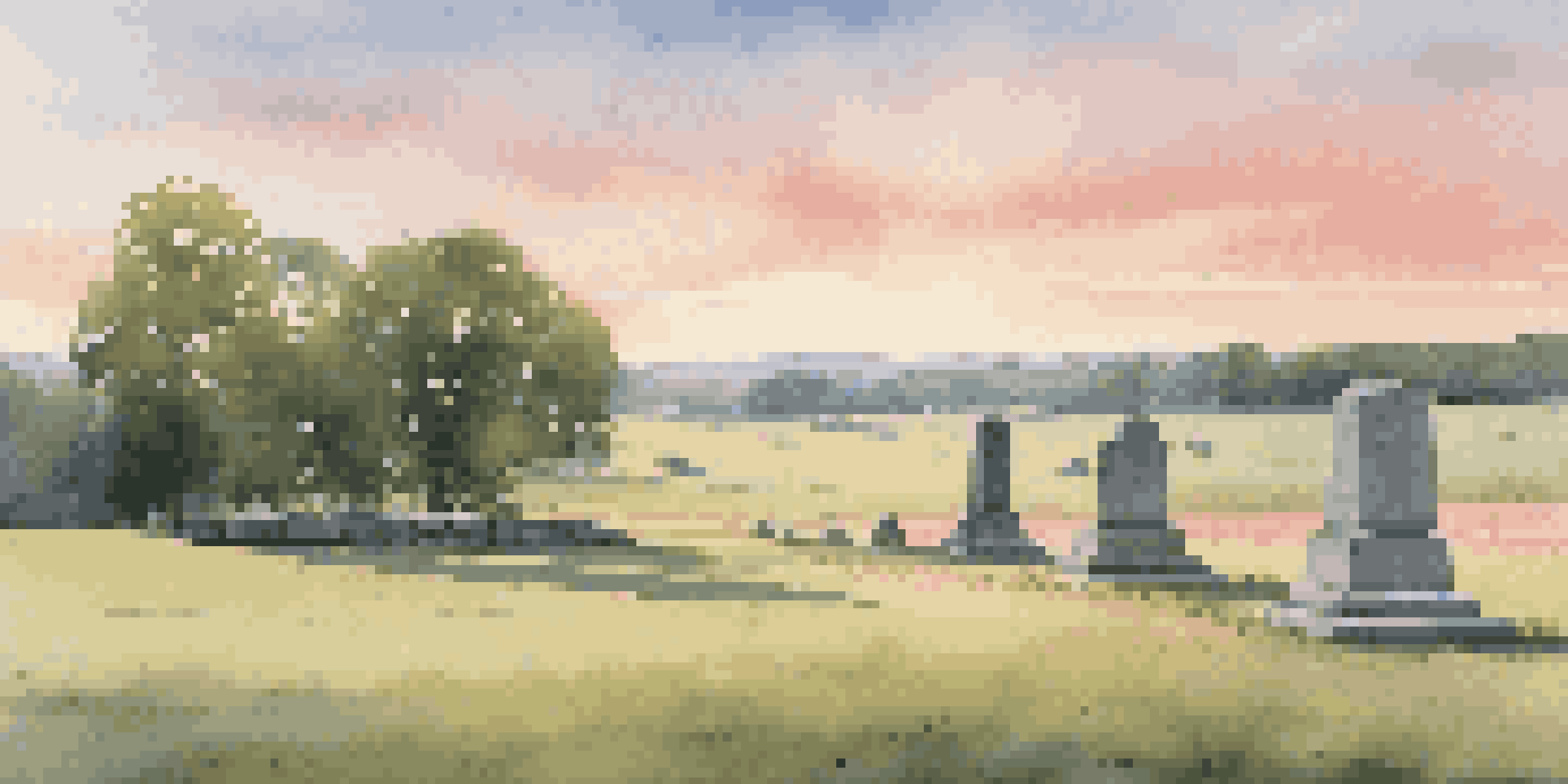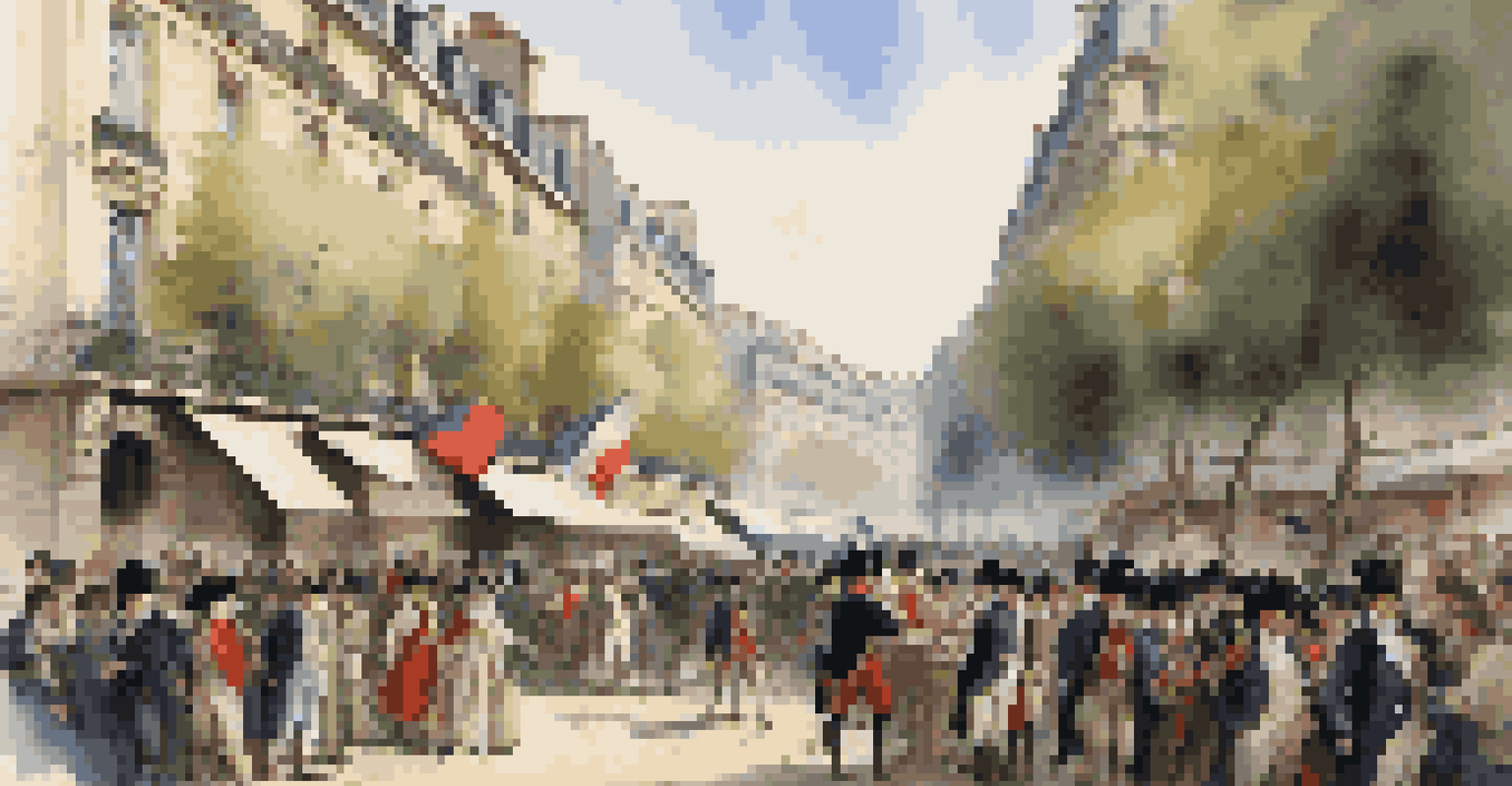The Significance of Place in Historical Writing

The Foundation of Historical Context: Why Place Matters
Place serves as the backdrop for historical events, providing context that shapes our understanding of the past. It is not just a physical location; it's intertwined with cultural, social, and political elements that influence historical narratives. Think of it as the stage where the drama of history unfolds, with each location adding its unique flavor to the story.
History is not a mere collection of facts; it is a narrative shaped by the places in which it unfolds.
For example, the impact of the American Civil War cannot be fully appreciated without considering the geographical divides between the North and South. Each region had its own culture, economy, and social structure, which played a significant role in the conflict. By examining these places, we gain insights into the motivations and experiences of those who lived through this tumultuous period.
Thus, recognizing the significance of place in historical writing enriches our comprehension of events. It allows us to connect the dots between geographical locations and the human experiences that occurred there, ultimately leading to a more nuanced understanding of history.
Place as a Character: The Role of Geography in Stories
In many historical narratives, place is not just a setting; it becomes a character in its own right. Locations can embody specific traits—some may represent freedom, while others may symbolize oppression. This personification of place helps readers engage more deeply with the narrative and understand the emotional weight of historical events.

Consider how cities like Paris during the French Revolution or Berlin during the Cold War evoke strong emotional responses. These locations are steeped in history, and their unique characteristics influence the stories that unfold within them. By treating place as a character, historians can convey the complexities of human experiences tied to geographical settings.
Place Shapes Historical Understanding
The geographical context of events enriches our comprehension of history by illustrating how location influences narratives and human experiences.
Recognizing this dynamic relationship between people and their environments allows for richer storytelling. It highlights how places can influence decisions, shape identities, and ultimately become integral to the narratives we study.
The Influence of Place on Historical Perspectives
Different places can lead to varying interpretations of the same historical events. For instance, the way a particular country views its colonial past can differ drastically depending on its geographical and cultural context. This variation in perspective is crucial for historians to consider when writing about global history.
Places are the stories we tell about ourselves, and they shape our identities and memories.
Take the example of World War II; the experiences and memories of the war differ greatly between countries involved. While Germany may focus on themes of guilt and responsibility, countries that faced occupation might highlight resistance and survival. These perspectives, shaped by their respective places, contribute to a more comprehensive understanding of the war's impact.
By acknowledging the influence of place on historical perspectives, writers can present a more balanced narrative. This approach encourages readers to appreciate the diversity of experiences and interpretations that shape our collective memory.
Place and Memory: How Geography Shapes Collective Identity
Locations often hold significant memories for communities, serving as touchstones for collective identity. Monuments, battlefields, and historic sites become places of remembrance, where societies engage in reflection and commemoration. This connection between place and memory is vital for understanding how history is preserved and shared.
For example, the significance of Gettysburg as a battlefield is not just about the events that occurred there; it's also about how that place has become a symbol of sacrifice and unity in American history. Such places foster a sense of belonging and shared heritage among communities, influencing how they perceive their history.
Place as a Character in History
Locations in historical narratives often embody traits that evoke emotional responses, making them integral to the stories we tell.
Thus, exploring the relationship between place and memory reveals how historical narratives are shaped. It emphasizes the importance of preserving these locations, as they play a crucial role in maintaining the narratives that define us.
The Role of Place in Shaping Historical Narratives
The way history is written can be significantly influenced by the places where historians conduct their research. Access to archives, local stories, and community insights often depends on geographical factors. This reality can lead to biases in historical narratives, as some places may be more documented than others.
For instance, histories of colonialism may focus more on prominent cities and regions, while rural areas might be overlooked. Such omissions can create gaps in our understanding of history, emphasizing the need for diverse geographical representation in historical writing.
By recognizing how place shapes narratives, writers can strive for inclusivity. This ensures that a broader range of experiences and perspectives are represented, leading to a more comprehensive and accurate portrayal of the past.
Changing Landscapes: The Evolution of Place in History
Places are not static; they evolve over time, and this evolution can significantly influence historical writing. Urban development, natural disasters, and cultural shifts can alter the character of a location, impacting how history is understood. Recognizing these changes is essential for historians who aim to accurately depict the past.
For example, cities that were once centers of industry may transform into hubs of technology and innovation. This shift affects not only the identity of the place but also the narratives that emerge from it. By understanding the evolution of places, historians can provide context that reflects both the past and the present.
Interconnectedness of Global History
Understanding the links between local places and global events helps illuminate broader historical patterns and enriches our view of history.
Thus, embracing the dynamic nature of place enriches historical writing. It allows for a more fluid understanding of how historical narratives are shaped by both enduring and changing geographical contexts.
The Interconnectedness of Place and Global History
In our increasingly interconnected world, the significance of place in historical writing extends beyond local narratives. Global events often have deep-rooted connections to specific places, and understanding these links can illuminate broader historical patterns. This interconnectedness emphasizes the importance of examining place in a global context.
For instance, trade routes like the Silk Road were not just geographical pathways; they facilitated cultural exchange and shaped civilizations. By studying these connections, historians can uncover how local histories are intertwined with global developments, leading to a richer understanding of world history.

Ultimately, recognizing the interconnectedness of place and global history helps us appreciate the complexities of human experiences. It encourages a holistic view that transcends geographical boundaries, connecting local stories to the larger tapestry of history.
Conclusion: Embracing Place in Historical Writing
The significance of place in historical writing cannot be overstated. It serves as a vital lens through which we examine events, memories, and narratives. By prioritizing place, historians can create richer, more nuanced accounts that resonate with readers on a personal level.
As we reflect on the role of geography in shaping history, we are reminded that every location tells a story. Whether it's the streets of a bustling city or the quiet corners of a rural landscape, each place contributes to our understanding of the past and our identity as a society.
In embracing the significance of place, we not only honor the stories of those who came before us but also pave the way for future generations to connect with history in meaningful ways. It encourages a deeper exploration of the world around us and fosters a greater appreciation for the diverse narratives that shape our collective memory.